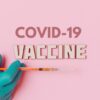Most of us know that smoking—be it conventional cigarettes or electronic cigarettes (e-cigarettes)–is likely to harm our health in some way. While many of the dangers of cigarette smoking, such as lung cancer, heart disease, chronic obstructive pulmonary disease (COPD) and even eye diseases, are well-known, some of the dangers associated with e-cigarettes are less clear.
On June 23, 2022, the Food and Drug Administration (FDA) announced it was banning from the market all products made by the largest e-cigarette manufacturer, Juul. The agency stated that the company hadn’t provided sufficient evidence that products were not toxic.
Juul appealed the ruling, and the court has issued an emergency stay to allow the products to remain on the market temporarily.
Juul is not the only e-cigarette, but it is one of the most commonly used. If you use e-cigarettes and are looking to quit because your brand may become unavailable or you would just like to improve your health, here’s what you need to know.
What Is the Difference Between Cigarettes and E-Cigarettes?
The addictive ingredient in both cigarettes and E-cigarettes is nicotine. With traditional cigarettes, you inhale nicotine along with smoke, whereas e-cigarettes are devices that contain a pod filled with liquid. When that liquid is heated, you inhale a vapor that contains nicotine and flavorings.
A large review of studies shows that e-cigarettes may help a small number of people quit smoking traditional cigarettes by acting as a stepping stone to total abstinence. However, some experts argue that the devices can encourage a higher intake of nicotine than cigarettes because one pod contains an entire pack of cigarettes’ worth of the drug. Smoking e-cigarettes is different, and potentially more harmful than finishing a single cigarette, because the natural stopping point is finishing the pod.
Some experts say it could be harder to quit e-cigarettes, because you may be inclined to consume higher quantities of nicotine than you would with cigarettes, thanks to smooth vapor. However, they still suggest the same methods for quitting e-cigarettes as they do for quitting cigarettes: counseling, emotional support and medications.
Nicotine-Withdrawal Symptoms
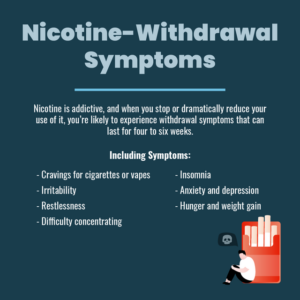
Nicotine is addictive, and when you stop or dramatically reduce your use of it, you’re likely to experience withdrawal symptoms that can last for four to six weeks. These symptoms include:
- Cravings for cigarettes or vapes
- Irritability
- Restlessness
- Difficulty concentrating
- Insomnia
- Anxiety and depression
- Hunger and weight gain
How to Quit Vaping or Smoking
Withdrawal symptoms can make quitting smoking very difficult. Cravings for cigarettes or e-cigarettes can last long after the other symptoms fade. However, a little planning can go a long way to help you combat symptoms and cravings. There are also drugs that can help stave off withdrawal symptoms.
Non-Pharmaceutical Strategies to Help You Quit Vaping or Smoking
Remember Your “Why”
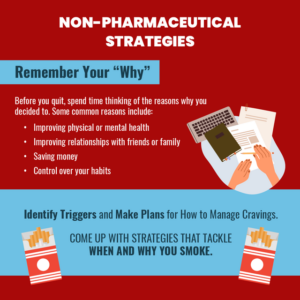
Before you quit, spend time thinking of the reasons why you’re doing so. Are you hoping to improve your physical or mental health? Do you want to save money? Will quitting help improve relationships with friends and family? Do you think you’re being controlled by your vape or cigarettes? Think about why you want to quit and what you want your life to look like once you do. Remember those answers when the cravings strike.
Identify Triggers and Make Plans for How to Manage Cravings
Think about when and why you smoke. Do you pull out your vape when you’re feeling stressed? Do you use it regularly when driving? Is it something you do often with friends?
Once you stop vaping, you’ll still find yourself in these situations. A very stressful day may leave you rushing to the store for a pack of cigarettes or a vape pod. Before you even quit, come up with strategies on how to handle these everyday situations without smoking.
Some options could include practicing breathing exercises or yoga when you feel stressed. It might be helpful to make sure you tell all your friends in advance that you’re quitting and practice saying “no,” if they offer you cigarettes or a vape. You can also ask them not to smoke around you.
Enlist Support
One of the best ways to help you stay on track is to seek help. There are a variety of free programs designed to help you stay nicotine-free.
The Ex Program: The program offers support based on your age group. It includes video and written guidance on how to quit, text messaging, emails, coaches and peer support. It’s available in English and Spanish.
Become an Ex: The Mayo Clinic and the tobacco-control organization Truth Initiative developed this program, which includes resources, a customized quitting plan, text- message support and community support.
This is Quitting: Another Truth Initiative offering, this program provides anonymous support geared to younger users (teens and young adults).
CDC Programs: The Centers for Disease Control and Prevention (CDC) offers several sources of support. These sources include a confidential coaching hotline, 1-800-QUIT-NOW (offered in English, Spanish, Mandarin, Cantonese, Korean and Vietnamese), text support at SmokeFreeTXT and an app, QuitSTART.
Pharmaceutical Options to Help Quit Smoking or Vaping
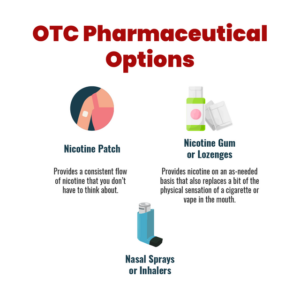
Some of the most commonly used treatments to help people quit smoking are nicotine- replacement therapies. These treatments allow you to reduce withdrawal symptoms by delivering nicotine, without any of the other harmful chemicals found in cigarettes and vapes. Using these treatments can be a stepping stone to quitting completely. You can buy nicotine-replacement therapies over the counter (OTC). It’s always a good idea to discuss trying them out with your healthcare provider first.
OTC Nicotine-Replacement Therapies
For people who want a consistent flow of nicotine that they don’t have to think about, nicotine patches may be a good option. For those who want a treatment that provides nicotine on an as-needed basis that also replaces a bit of the physical sensation of a cigarette or vape in the mouth, gum or lozenges may help. Other options include nasal sprays and inhalers. Side effects vary based on the method.
Side effects of nicotine-replacement therapies:
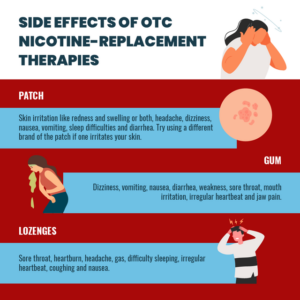
- Patch: Skin irritation like redness and swelling or both, headache, dizziness, nausea, vomiting, sleep difficulties and diarrhea. Try using a different brand of the patch if one irritates your skin.
- Gum: Dizziness, vomiting, nausea, diarrhea, weakness, sore throat, mouth irritation, irregular heartbeat and jaw pain.
- Lozenges: Sore throat, heartburn, headache, gas, difficulty sleeping, irregular heartbeat, coughing and nausea.
- Nasal spray: Irritated nose, sneezing, throat irritation, runny nose, watery eyes, coughing and a hot feeling in your throat.
- Inhalers: Coughing, sore throat, dizziness, irregular heartbeat, nervousness, runny nose, upset stomach and mouth or throat irritation.
Prescription Drugs That May Help You Stop Smoking or Vaping
Chantix (varenicline): Varenicline was developed to aid in smoking cessation. The drug stimulates some of the same brain cells as nicotine to help reduce withdrawal and cravings.
Side effects of varenicline
From 2009 to 2016, both varenicline and Zyban (bupropion) carried a black box warning. The drugs can cause suicidal ideation and other serious psychiatric events. The FDA voted to remove the warnings on both in 2016, after a large trial suggested that while the risks still existed, they were lower than originally anticipated. Below are other side effects:
- Nausea
- Gastrointestinal distress, such as gas, constipation, diarrhea, abdominal pain and vomiting
- Rash
- Heartburn
- Dry mouth
- Insomnia and abnormal dreams
- Headache
- Fatigue
- Seizures
- Mood changes
- Joint or muscle pain
Zyban (bupropion): bupropion is an antidepressant that has helped some people quit smoking. It works by increasing the availability of two neurotransmitters in your brain: norepinephrine and dopamine.
Side effects of bupropion
As mentioned above, both varenicline and bupropion carried a black box warning for seven years. The drugs can cause suicidal ideation and other serious psychiatric events. The FDA voted to remove the warning in 2016, after a large trial suggested that while the risks still existed, they were lower than originally anticipated. You may experience:
- Drowsiness
- Insomnia
- Anxiety
- Dizziness
- Dry mouth
- Headache
- Gastrointestinal effects
- Tremors
- High blood pressure
- Nasal congestion
- Appetite loss
- Sweating
- Sore throat
- Changes in how you taste flavors
Clonidine: Clonidine is an anti-hypertensive drug, which is sometimes used to treat symptoms of nicotine withdrawal, such as anxiety, restlessness and irritability.
Side effects include:
- Dry mouth
- Weakness
- Fatigue
- Headache
- Sexual dysfunction
- Nervousness
- Nausea
- Vomiting and constipation
Now’s a Good Time to Quit
With the FDA poised to remove Juul e-cigarettes from the market, now is an excellent time to consider quitting. In many cases, it can take you more than one attempt to give up nicotine. A variety of tools can help you along your way. Quitting now will protect your physical and mental health for years to come.




